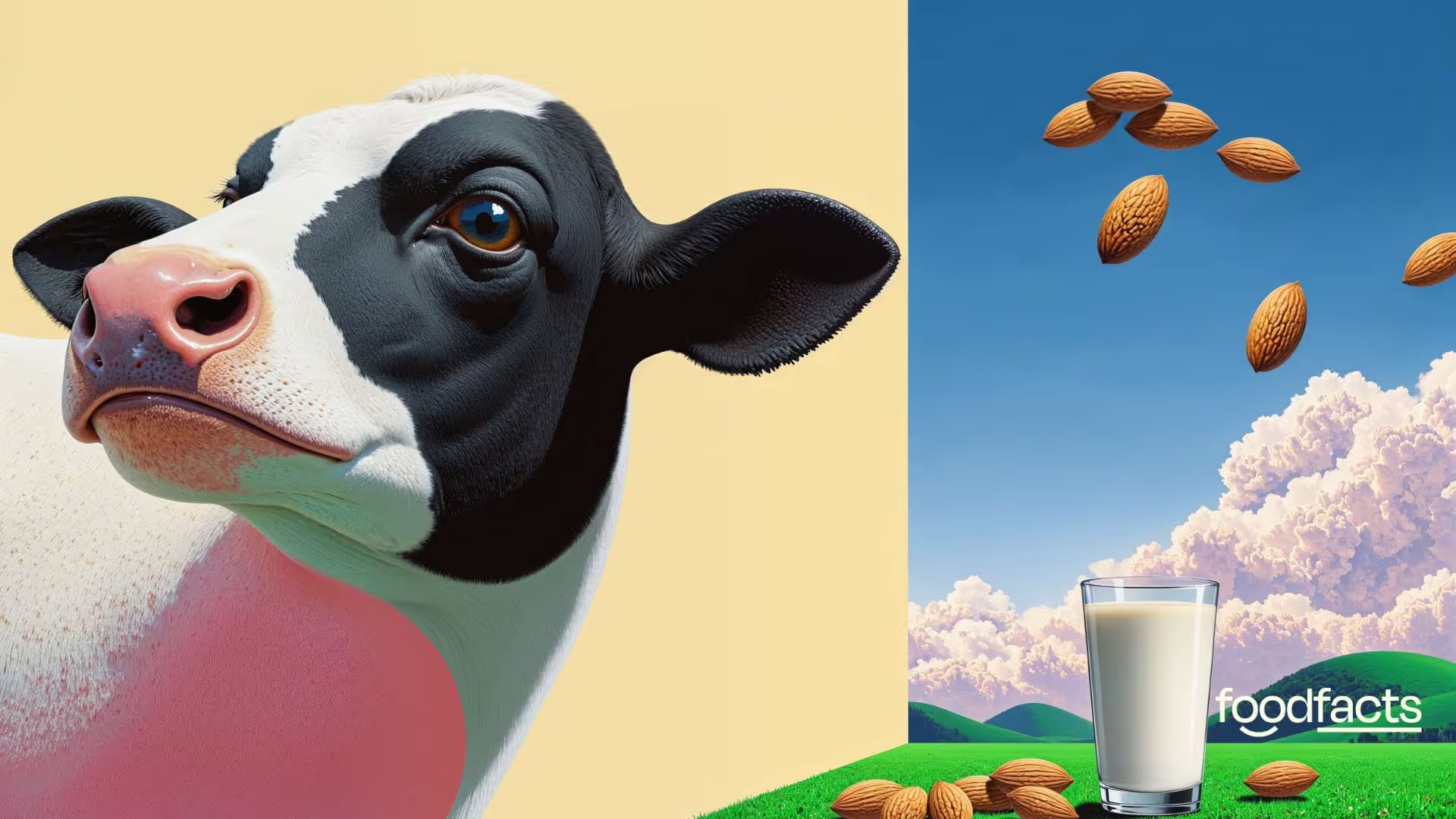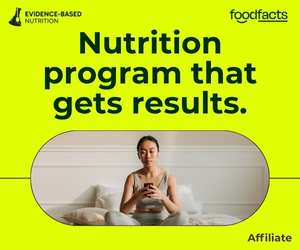
The great milk debate: does the science support recent claims?





Coral Red: Mostly False
Orange: Misleading
Yellow: Mostly True
Green: True
Learn more about our fact-checking policies
A recent article published in the Telegraph compared various sorts of milk to each other and came out in strong favour of cow’s milk, but is it really what's best for our health? Let’s have a look at the claims made.
Nothing the author states is untrue, however, some claims regarding cow’s milk are tentative findings and may require further investigation. Likewise, not all supposed health benefits of cow’s milk are unique to cow’s milk, so at times throughout the article, the reporting is unbalanced.
Nowadays, we have more food choices than ever and are constantly faced with information on what to eat and what not to eat. As such, it is vital to place this information in context to ensure we have the full picture before making decisions.

Does an article only mention the benefits or risks? Good information presents both sides.
Claim 1: Cow’s milk is full of protein and calcium
The article states that a 200 mL glass of milk contains 7 grams of protein and 130 milligrams of calcium. While this is true, these nutrients are not unique to cow’s milk. Soy milk, for instance, contains 6g of protein per 200 mL , with some higher protein varieties containing up to 10g of protein for the same amount. The article correctly points out that other varieties of plant-based milk, like almond or oat, contain much less protein compared with dairy or soy milk.
In terms of calcium, thanks to fortification, most plant-based milks contain almost around the same amount per glass compared with cow’s milk. The exception to this rule are organic products, as organic standards do not allow the addition of synthetic ingredients including vitamins and minerals.
The author did not touch on bioavailability of calcium across various milks, but did you know that most bioavailable sources of calcium are actually certain types of vegetables, including bok choy, brussel sprouts, and broccoli? They may not contain as much calcium as milk per portion, but their high absorption rate makes them worth considering. All the more reason to eat your greens!
The average adult (19+) requires 700mg of calcium and 45-55g of protein a day.
At the end of the day, whether you opt for plant-based or cow’s milk, both varieties can cover your nutritional needs.
Claim 2: Cow’s milk is a great source of B12
B12, which is important for energy metabolism, is almost exclusively found in animal-based foods.
Despite fortification, plant-based milks tend to contain less B12 than cow’s milk, which is a good source of it, as the article correctly states.
Nonetheless, for people who don’t want to reach for dairy drinks, B12 can also be found in nutritional yeast, shiitake mushrooms, algae products, or a variety of affordable supplements.
Claim 3: It boosts serotonin
The article cites a study claiming to link dairy milk consumption to reduced rates of anxiety and depression, however while the study is interesting, as pointed out by their expert, Rob Hobson, it cannot tell is the full story about causality. Click here to read our in-depth fact-check of the study in question.
The article goes on to say that fatty acids in dairy milk can have a protective function in the brain as well as tryptophan, which is associated with serotonin production. There is some research that indicates a potential benefit to brain health from polyunsaturated fatty acids from cow’s milk, but the results remain controversial.
Tryptophan is an amino acid, which is a building block of protein and a precursor of serotonin. As such, it can be found in most sources of protein, including but not limited to milk. Nuts and seeds, for example, are a real powerhouse containing plenty of good fats, as well as tryptophan.
Furthermore, it’s important to note that the majority of the fats in dairy milk are saturated fats, which has been linked to increased cholesterol levels in the blood and can increase the risk of having a heart attack or stroke if consumed in excess. Plant-based alternatives on the other hand, generally contain much less saturated fat, making them a healthier choice for people trying to watch their saturated fat intake.
Claim 4: It helps to lower bowel cancer risk
Lastly, the claim that dairy consumption can reduce bowel cancer risk is true. A large-scale study published in Nature Communications showed that consuming 300mg of calcium daily could lower the risk of bowel cancer by 17%. Scientists concluded that this effect was driven for the most part by the additional calcium consumed, as opposed to specifically dairy products, meaning the same protective effect could also be achieved with calcium from other sources, including plant-based milks.
The ‘best’ choice is individual
When taking nutrition advice from online sources, it is important to remember that the healthiest diet for each person is dependent on personal factors such as age, sex, activity level, food intolerances, or other health factors.
A balanced diet, whether it includes animal-based foods or not, can meet nutritional requirements, and many of the benefits discussed above are not unique to cow’s milk. Whether cow’s milk is ‘best’ for our health, therefore, cannot be said universally.
Dairy milk is a nutritionally interesting food, rich in protein and key micronutrients such as calcium, iodine, and vitamin B12. Its nutrient profile and food matrix may even help mitigate the potential risks associated with its saturated fat content. However, this does not mean it is inherently superior to plant-based alternatives. Today, most plant-based milks (with the exception of organic products) are fortified with essential nutrients that might otherwise be lacking in the diet. While some express concerns over their ultra-processed nature, this argument leans toward the ‘appeal to nature’ fallacy. Current evidence does not show any association between plant-based ultra-processed foods and negative health outcomes. In fact, it may suggest the opposite. When included as part of a balanced diet, plant-based milk alternatives are nutritionally sound.
Stand Against Nutrition Misinformation
Misinformation is a growing threat to our health and planet. At foodfacts.org, we're dedicated to exposing the truth behind misleading food narratives. But we can't do it without your support.
📚 Sources
Alpro UK. Soya. Retrieved from https://www.alpro.com/uk/products/drinks/soya-plain/soya-original.
Alpro UK. High Protein Soya. Retrieved from https://www.alpro.com/uk/products/protein/protein-drinks/drink-high-protein-plain-50g
Buchowski, M. (2015) CHAPTER 1: Calcium in the Context of Dietary Sources and Metabolism. The Royal Society of Chemistry.
NHS. (2020). Vitamins and Minerals: Calcium. Retrieved from https://www.nhs.uk/conditions/vitamins-and-minerals/calcium/.
Craig, E. (2025) The Telegraph. Retrieved from https://www.telegraph.co.uk/health-fitness/diet/nutrition/cows-milk-good-for-you-healthiest-dairy-alternatives-to-buy/.
Colquhoun, J. (2021). Best Sources of Vitamin B12 for a Plant-Based Diet. Retrieved from https://www.foodmatters.com/article/best-sources-vitamin-b12-plant-based-diet.
NHS. (2023). Dairy and alternatives in your diet. https://www.nhs.uk/live-well/eat-well/food-types/milk-and-dairy-nutrition/.
Mollica M., et al. (2021). Milk Fatty Acid Profiles in Different Animal Species: Focus on the Potential Effect of Selected PUFAs on Metabolism and Brain Functions. Retrieved from https://pmc.ncbi.nlm.nih.gov/articles/PMC8066999/.
Papier K. (2025). Diet-wide analyses for risk of colorectal cancer: prospective study of 12,251 incident cases among 542,778 women in the UK. retrieved from https://www.nature.com/articles/s41467-024-55219-5.
Public Health England. (2016). Government Dietary Recommendations. Retrieved from https://assets.publishing.service.gov.uk/government/uploads/system/uploads/attachment_data/file/618167/government_dietary_recommendations.pdf.
Zilpah S. (2023). Foods High in Tryptophan. Retrieved from https://www.webmd.com/diet/foods-high-in-tryptophan.



foodfacts.org is an independent non-profit fact-checking platform dedicated to exposing misinformation in the food industry. We provide transparent, science-based insights on nutrition, health, and environmental impacts, empowering consumers to make informed choices for a healthier society and planet.

Was this article helpful?















.svg)
